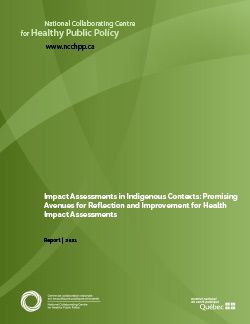Impact Assessments in Indigenous Contexts: Promising Avenues for Reflection and Improvement for Health Impact Assessments
This document is intended for public health authorities who wish to undertake a health impact assessment (HIA) in Indigenous contexts in Canada, practitioners working in the field of impact assessment, and Indigenous organizations that wish to undertake or participate in impact assessments.
Approaches to prospectively assessing the environmental, social and health impacts of policies, programs or projects are increasingly being implemented and standardized in a large number of countries. When these approaches are implemented in Indigenous contexts in Canada, that is, when they involve First Nations, Inuit or Métis, they raise specific issues related in large part to the gap that exists between the worldviews held in these communities and the Western approaches to evaluation that underpin the practice of impact assessment (IA). This discrepancy can be observed, in particular, in relation to conceptions of health, to knowledge systems, to the information used to estimate the effects of a project on communities, as well as to the imbalance in the powers of influence when it comes to decision making.
In order to identify potential strategies for reducing this gap, the National Collaborating Centre for Healthy Public Policy conducted an analysis of articles on this topic after having reviewed the scientific literature published between 1945 and 2019. This analysis led to the formulation of some suggestions for courses of action aimed at adjusting the practice of HIA in Indigenous contexts:
- The use of models of “health” and its determinants adjusted to the cultural context and validated with local communities;
- The use of analytical tools adjusted to Indigenous contexts and validated with local communities;
- Support for the preparation of Indigenous communities in advance of impact assessments, enabling them to develop, for example, baseline information concerning their values, priorities, non-negotiable aspects of their lifestyles, health status, etc.;
- Building of the capacities of Indigenous communities, for example through training opportunities related to impact assessment, aimed at promoting co-management of the processes and increasing opportunities for Indigenous collaboration with external experts.
These courses of action are directed toward the following three areas for improvement:
- The data collected (concept of health, traditional knowledge, cumulative effects);
- The overall approach and working method (concept of efficiency, participation, co-management);
- Institutional contexts (Acts, government policies, organizational resources).


